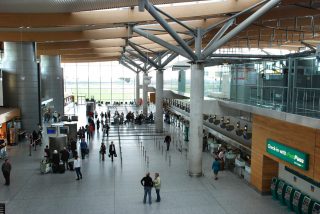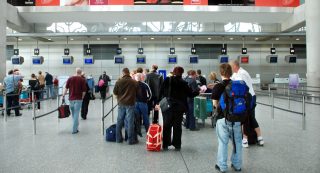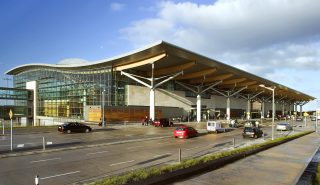Cork Airport prides itself on doing things differently. The facility, serving Ireland’s largest provincial city, is the international gateway to the south of Ireland. Welcoming over 7,000 passengers a day, and more than 10,000 passengers a day in peak season, it is the country’s second busiest airport. More than 2 million passengers travel through the airport each year, flying to over 50 destinations across Europe.
“We give airlines what they need - passengers, marketing support and risk sharing incentives to support and grow their business. We offer independent minded passengers that love to travel for business and leisure and a dedicated business development team, acting as the eyes and ears on the ground,” Niall MacCarthy, airport director, Cork Airport explained to The HUB during an exclusive interview this week.
“We give airlines what they need - passengers, marketing support and risk sharing incentives to support and grow their business. We offer independent minded passengers that love to travel for business and leisure and a dedicated business development team, acting as the eyes and ears on the ground.”
Niall MacCarthy
Airport Director, Cork Airport
Cork Airport serves the country's southern commercial city of half a million people and a city region of over 1.1 million population along with providing access to the majority of the country's southern population base of 1.8 million potential customers. A significant element of the country's economic activity outside of Dublin is located along the southern seaboard easily accessed through Cork Airport.
The airport has a significant and growing catchment area demanding ever increasing connectivity with Europe and beyond for business and leisure and this has helped support its business development. Already this year Cork Airport has welcomed ten new routes including Krakow and East Midlands and it is on track to achieving 2.3 million passengers for 2013.
Throughout 2013, Ireland has opened its arms to hundreds of thousands of friends and family from all over the world, calling them home to gatherings in villages, towns and cities. There are roughly one million Irish-born people living abroad and there is an Irish Diaspora of around 70 million people around the globe. Cork Airport is the main gateway to the south of Ireland for these visitors.

As part of its continued commitment to, and support of, ‘The Gathering’ 2013, the airport is gearing up for an exciting autumn and will be sponsoring Cork Jazz Weekend in October and of course, the keynote event in Cork’s gathering activity, Cork Rebel Week. Rebel week will run from October 14 - 20 and the weeklong event will see Cork Airport at the heart of the activity, with the airport sponsoring the unique and novel ‘Cork Passport’ scheme.
A key part of Cork Airport’s success with airline and tour operator partners is its generous five-year schemes for supporting start-up services, which was recently also extended to resumed services. It has very extensive Route Support Schemes for new long and short haul routes and Marketing Support is also available to help in the formative years of launching any new routes.
On the long-haul side its Long-Haul Route Support Scheme (RSS) offers annual discounts of 100%, 90%, 75%, 50% and 25% on passenger charges, aircraft parking, airbridge and runway movement charges over five years, while its Short-Haul Route Support Scheme (RSS) this year offers annual discounts of 100%, 75%, and 50% on passenger charges, aircraft parking, airbridge and runway movement charges over three years.

Additionally, Cork Airport offers its ‘GROWTH Incentive Scheme’ which has been in operation since 2011. This initiative operates in conjunction with the New Route Incentives and is aimed at further stimulating passenger growth at Cork Airport. It has been amended and improved during its duration and now offers a full rebate of Passenger Service Charges for traffic growth over a three-year period. A further enhancement is the reduction in the initial threshold to the actual traffic level recorded in 2011.
A further offering is the Cork Airport Standby Aircraft Incentive (SAI) for Relevant Operators in respect of aircraft parking charges. Under this scheme a ‘relevant’ operator is not be charged aircraft parking charges in relation to a Standby Aircraft for periods on which it is parked on a Standby Aircraft Stand.
A number of Infrastructural and Environmental projects are currently underway at Cork Airport as €2.4 million is invested to upgrade its baggage security screening system to latest EU standards. Work on upgrading the system commenced early in 2013. All European International Airports are required to comply with new EU standards and delivery of the Cork Airport upgrade will ensure the Airport’s compliance with an EU Directive that sets a deadline for completion by January 2014.

Cork Airport’s baggage system catered for 2.4 million passengers with over 1.2 million bags last year (excluding hand baggage) and the Airport expects a similar figure in 2013. The upgrade project is scheduled mostly at night-time in order to minimise disruption to airport operations and to ensure that the upgrade is completed before the peak summer season begins.
“This project is about Cork Airport’s compliance with the highest international security standards for hold baggage,” explained MacCarthy. “The long term view is important in the airport business and significant planning is required to ensure that the airport’s systems are safe, secure and provide the best possible service to the thousands of passengers who use our terminal every day.”
All works will take place within a restricted area airside and normal airport operations concerning passengers will be largely unaffected by the baggage upgrade. The new security screening units, once installed, will greatly improve overall imaging and detection quality and will achieve optimum baggage throughput requirements consistent with expected passenger growth at Cork Airport.
Alongside this project, Cork Airport has made huge strides in reducing its energy costs and achieved a Level 2 rating under the European Airport Carbon Accreditation Programme. For the four year period since 2008, the Airport has reduced its gas usage by a staggering 50% while electricity consumption has decreased by 25%.

This significant energy cost reduction is a direct result of Cork Airport’s work towards achieving Airport Carbon Accreditation. The European wide aviation accreditation blueprint enables airports to implement carbon reduction programmes. Having successfully achieved Level 2 accreditation, the ultimate goal is for the Airport to achieve Level 4, or carbon neutral status. Reaching Level 4 status will involve offsetting the remaining footprint associated with the Airport’s day-to-day operations.
The introduction of electric vehicles at Cork Airport will contribute to the overall carbon reduction process. While there are a number of electric vehicles operating airside at the airport, Cork Airport is currently trialling electric vehicles to operate on the full campus and expects to introduce these vehicles to the fleet by the end of this month.
Niall MacCarthy is delighted with the Airport’s Level 2 status achievement: “Since we introduced the European wide Airport Carbon Accreditation scheme here at Cork Airport, a reduction of 2,490 tonnes of carbon has been recorded which is a very significant achievement for Bill Daly, our head of asset care and all the team here in Cork. This equates to taking 725 cars off the road for one year.”

“During the construction of the new terminal, Cork Airport made significant technical improvements and further enhancements to systems that were previously in place, to promote green energy usage. The reduction in energy usage not only reduces the carbon footprint but also delivers real savings to our operating costs. Through our partnership with the SEAI (Sustainable Energy Authority of Ireland), we will strive towards gaining Level 3 accreditation and onwards to achieving our ultimate Level 4 or carbon neutral status,” he added.
The European Airport Carbon Accreditation Programme was launched in 2009 by ACI Europe, the European region of Airport Council International. A total of 59 airports are now accredited representing 52.8% of European air traffic. The next step in this process is for Cork Airport is to achieve Level 3 status. This will involve the ongoing reduction of carbon emissions at the airport, while actively engaging with all third party operators on-site.





